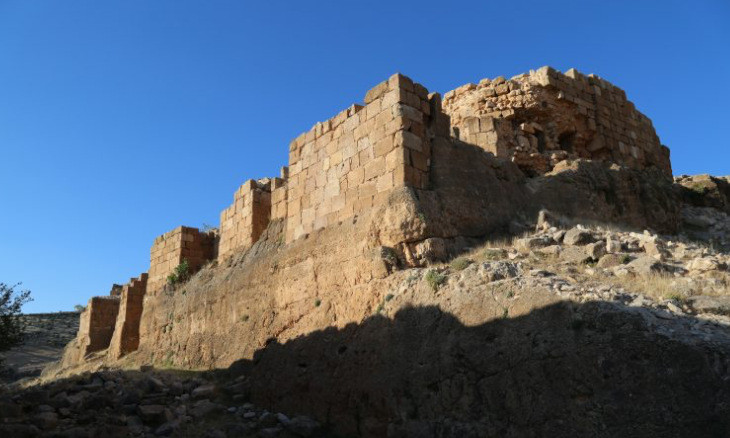Electric company deprives thousands of Mardin villagers of water during COVID-19 outbreak
Vecdi Erbay reports from Mardin: The tension between the Dicle Electric Distribution Company (DEDAŞ) and the villages of the southeastern province of Mardin intensified as the power cuts continue. A number of villagers recently went on a hunger strike to protest the power cuts.
Vecdi Erbay / DUVAR
 Wind energy plant threatens historic Rabat Castle in Mardin
Wind energy plant threatens historic Rabat Castle in MardinI've frequently brought up the issue of the tension between the Dicle Electric Distribution Company (DEDAŞ) and the villages of the southeastern province of Mardin. According to the villagers of Mardin, Turkish media are not exhibiting sufficient interest in their problems.
For instance, a number of villagers recently went on a hunger strike to protest the power cuts. The Kızıltepe Munipality brought tankers full of water to some villagers as they were going thirsty after having their power cut and as the electricity enables them to draw water from local wells. The villagers say that their animals have died from thirst. MPs from the pro-Kurdish People's Democratic Party (HDP) have raised the issue in parliament. For their part, the villagers have taken the matter to court and the court ruled on their behalf.
However, this problem - which has been ongoing for years - has yet to be solved. By refusing to acknowledge the court's decision, DEDAŞ has continued its practice of cutting power. For example, after electricity was restored following the court order, villagers were later subjected to an 18-hour power cut.
So what is the problem between the Mardin villagers and DEDAŞ? The villagers use electricity to draw water from the wells that they built themselves. When the electric system was privatized in 2009, electric companies started requesting payment for the electricity they used. But the bills were bloated and the companies also requested past debts. The villagers could not pay the bills and DEDAŞ cut the power of those who were in debt. Furthermore, not only did they cut the electricity for the transformers that enabled the villagers to water their fields, they turned off the power for the entire village.
 Istanbul, Ankara and three southeastern provinces lead in virus infections, says Health Minister
Istanbul, Ankara and three southeastern provinces lead in virus infections, says Health MinisterThe power cuts continued in May of this year. As a result, the villagers were unable to plant their second crop of corn for the season. As the coronavirus epidemic continues and the weather reaches a stifling 40 degrees Celsius, the villagers are unable to obtain water for themselves and their animals. They go to court and the court determines that they are right, but DEDAŞ continues to stick to its guns. The villagers are searching for the answer to the question: “Who is behind DEDAŞ?”
We spoke with lawyers Ali Aydemir and Hamdullah Korkmaz about the villagers' problems.
“The company, which has made a custom of violating the legislation, is reducing the entire electric line to monophase rather than just cutting off the electricity of a customer in debt. As the drinking water wells in the villagers operate with three phases of energy, they have not had access to drinking water for two months in the middle of a pandemic,” the lawyers said, adding that, as a result, the villagers and their animals have become dehydrated, and their trees are drying up.
Oddly enough, in court, DEDAŞ acknowledged that they had wronged the villagers:
 Wûf: Southeastern Turkey, dogs and humans
Wûf: Southeastern Turkey, dogs and humans“While we were expecting DEDAŞ to deny the mass cuts, they admitted to them and acknowledged that they had victimized tens of thousands of people due to the agricultural water debts of one segment,” the lawyers said.
Despite admitting guilt, DEDAŞ has brazenly refused to abide by the court's decision according to the lawyers, who said that under normal circumstances, a company carrying out public services would have to abide by the court ruling from the first day it was issued and would not be able to apply similar procedures to other villages:
“However, instead of complying with the court's decision, DEDAŞ chose to resist and even do the exact same thing in many other villagers. But it let be known, regardless of how many villages in which they implement power cuts, we will not give up our fight,” they said. The lawyers expressed their appreciation for the fact that the villagers have not bowed to DEDAŞ' victimization and have fought for their rights in court despite of being worn out from the painful process.
